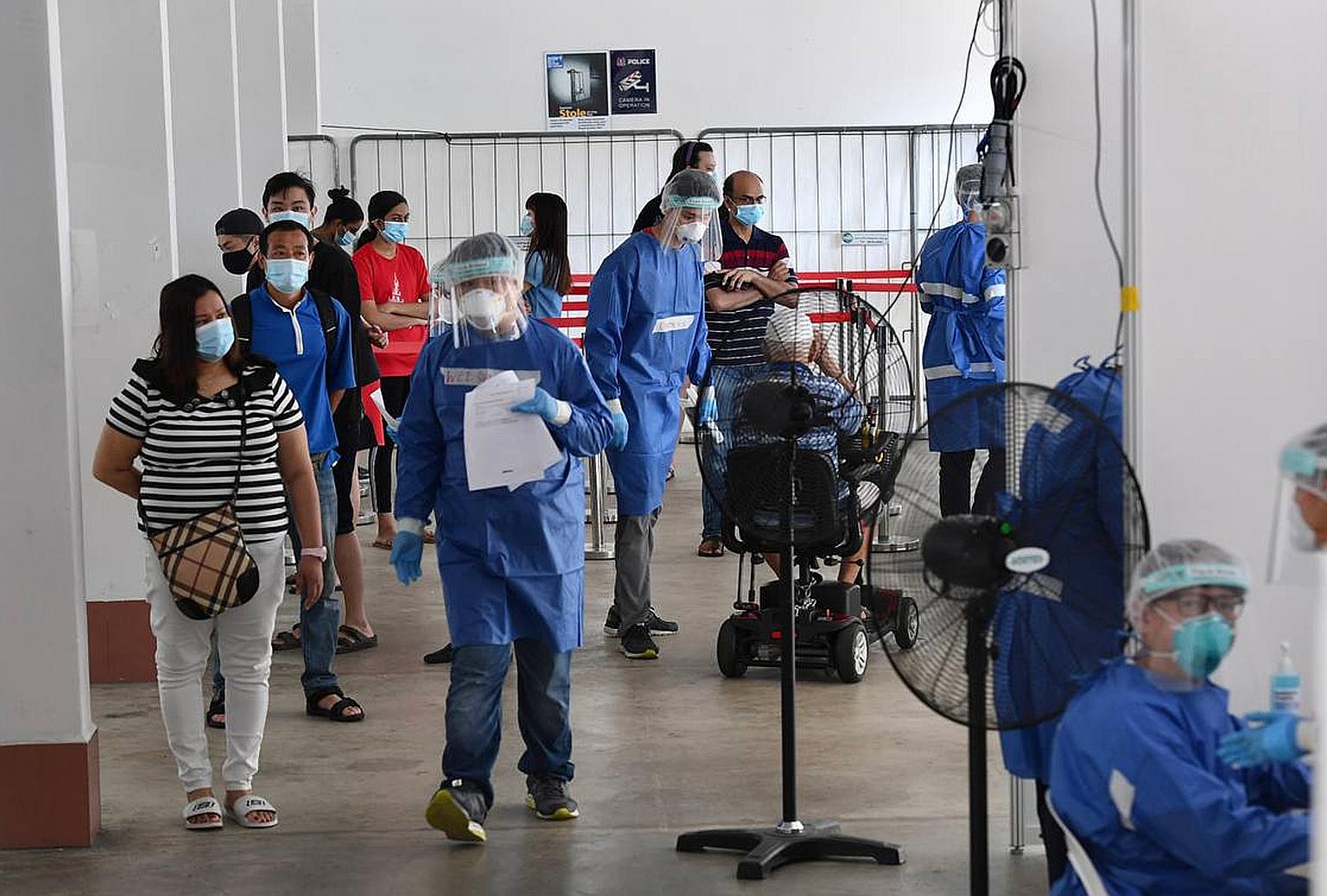Coronavirus: Singapore
Covid-19 vaccine could become like yearly flu shot, say experts on ST panel discussion
Disease likely to become endemic; regular booster jabs may also be needed as it mutates
Sign up now: Get ST's newsletters delivered to your inbox

Residents of Block 745 Yishun Street 72 waiting to be tested for Covid-19 yesterday. Surveillance testing had detected six cases among the block's residents.
ST PHOTO: DESMOND FOO
With the coronavirus that causes Covid-19 likely to become endemic, regular vaccination will be the new normal, experts said at a live panel discussion organised by The Straits Times yesterday.
"At some point, we will see Covid-19 being included as part of our national immunisation schedule for both adults and children, and perhaps we will need regular booster shots from time to time to make sure we continue to be protected, especially against any new emerging variants," said Professor Teo Yik Ying, dean of the Saw Swee Hock School of Public Health at the National University of Singapore.
"And, once in a while, there will be people who will be infected, just like with TB (tuberculosis), and just like with tetanus."
Most may not even know when they have been infected, he said.
But crucially, a Covid-19 infection for someone who is vaccinated "no longer bears a real risk of being hospitalised or potentially dying from it", added Prof Teo.
This view was shared by Professor Lisa Ng, executive director of the Agency for Science, Technology and Research's Infectious Diseases Labs.
"The coronavirus is a very large RNA virus, so it is bound to have occasional mutations as the virus continues to spread and evolve... but it is actually very important to note that most mutations are actually harmless and do not necessarily cause more severe disease in healthy people," she said.
"Currently, the data indicates that while this particular mutation is more transmissible, it is not necessarily more deadly. So, eventually, Covid-19 will become endemic, like the common cold and other respiratory infections."
She said it would be useful to take booster shots that have been updated with the different new variants, much like how flu vaccine shots are updated regularly.
Meanwhile, she said, scientists need to stay updated on the sequences of all the emerging new variants so that detection systems and assays will remain robust and sensitive enough to detect the virus, even in asymptomatic patients.
Assays are testing procedures for investigating the concentration of a substance.
Dr Danny Soon, chief executive of the Consortium for Clinical Research and Innovation Singapore, warned that the pandemic is far from over, as a small leak can take hold among unvaccinated people.
But people can now do something about it by getting vaccinated, said Dr Soon, who is also a member of the Ministry of Health's expert committee on Covid-19 vaccination. "Very few people who are vaccinated get very ill or die from the disease," he said.
Last month, even as the Covid-19 outbreaks in the United States and Britain were 10 times worse than in Singapore, both the US and Britain felt that infection numbers were good enough to loosen restrictions and allow people to mingle more.
Singapore, at that point, tightened measures further, stopping dining in at eateries and putting in place home-based learning for students, among other restrictions, Prof Teo noted.
"On a per capita basis - the number of cases given the population each country has - Singapore's outbreak in May was actually 10 times less than what the United Kingdom and the US were experiencing at that time," he said.
This was when Singapore adjusted its measures to keep up with new variants that had infiltrated the country, including the more infectious B16172 strain first discovered in India.
People infected with the variant have a much higher viral load, and the incubation period is much more variable, compared with infections involving the original strain of the virus. With the variant, a person can be contagious just one or two days after being infected, or after more than 14 days, said Prof Teo.
The experts' comments at the ST panel discussion, Living With Covid-19: Singapore's New Normal, which was moderated by ST science correspondent Audrey Tan, came a day after a nationally broadcast address by Prime Minister Lee Hsien Loong on living with an endemic virus.
PM Lee said Singapore will ramp up its pace of vaccination, and both test for and contact-trace Covid-19 cases more quickly and extensively as the country adjusts to deal with more infectious variants. He said that self-testing may become part of the new normal.
Covid-19 is the latest disease to emerge in an increasingly globalised and densely populated world. Scientists have said that more diseases will come.
At this point, while Covid-19 continues to rage around the world, it is at least clear, based on data from Singapore and globally, that vaccination works.
Citing preliminary data from Singapore, Prof Ng said that 97 per cent to 98 per cent of vaccinated individuals will generate antibodies against the spike protein of the coronavirus.
In the US, where more than 100 million people have been vaccinated, data suggests that when infected, these people show very mild or no symptoms at all, said Prof Teo.
He added that vaccination is not just to protect, but also to enable us to return to a degree of normalcy in our lives.


